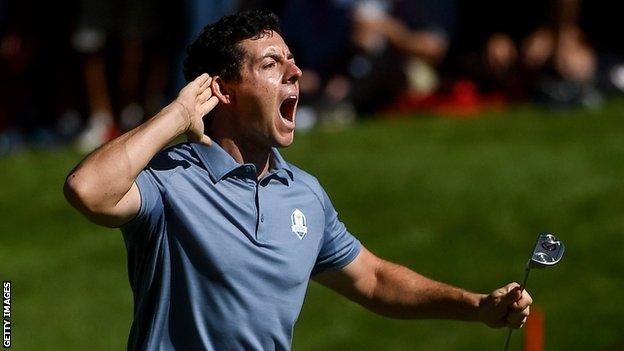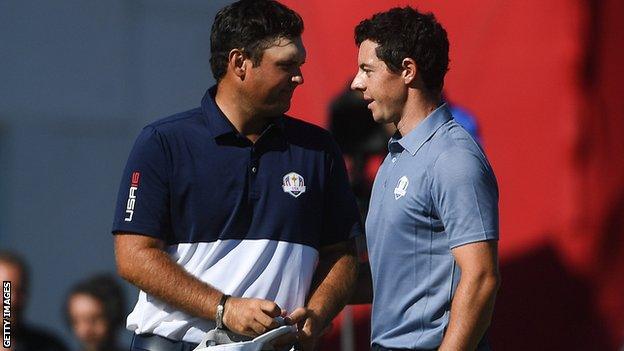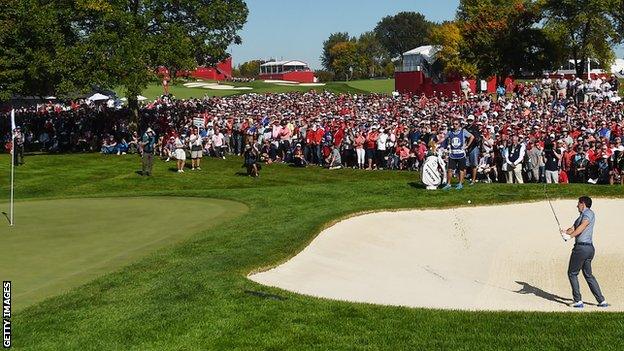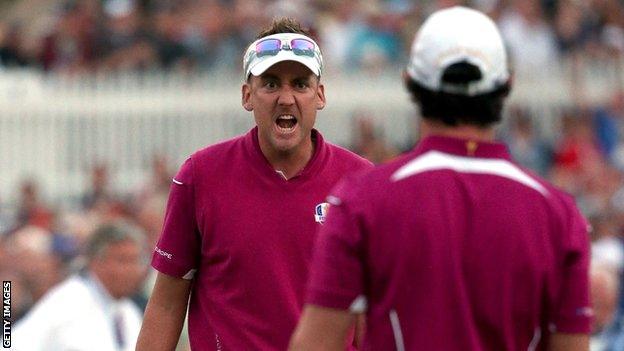Ryder Cup: Why golf's great tribal event can still enthral even without fans
- Published
- comments

Rory McIlroy has played at five Ryder Cups - and has been on the winning side at all except 2016
Anyone who was there will tell you that the earth moved on the eighth green at Hazeltine on Ryder Cup singles Sunday nearly four years ago.
Rory McIlroy holed a monster putt and aggressively gestured to vast crowds crammed next to the green. It was visceral. He was stoking fervent vitriol among the USA's home support, while pockets of European fans raucously celebrated.
Moments later, also from long range, his opponent Patrick Reed - Captain America - followed him in for a half in birdies. The home crowd went nuts: proper nuts.
It was pandemonium. It was special. The players exchanged gestures of mutual respect as they stalked to the next tee. Golf was being played in a uniquely rarefied atmosphere.
There are few greater sporting spectacles than a major Ryder Cup moment. So it is easy to see why McIlroy thinks Ryder Cup matches should not be played in the absence of spectators.
Organisers are having to consider the possibility of holding this year's match, in Wisconsin, behind closed doors because of the coronavirus pandemic.
"I would much rather they delay it until 2021 than play it at Whistling Straits without fans," McIlroy said.

McIlroy's gripping battle with Patrick Reed was a highlight of the last Ryder Cup in the USA, four years ago
McIlroy is not alone. Several players and pundits share his view. And, yes, the Ryder Cup is an elevated event that should always be played before fervently committed supporters.
They contribute hugely to these biennial occasions when golf becomes truly tribal. But, as we know, that may not be possible this year.
Many things are proving impossible and golf and its precious Ryder Cup may need to adapt.
Which makes me wonder, in these difficult times, whether it would be more welcome to hear top stars embrace a notion that, if it is safe enough, the show must go on; if it can be played, it should be played - fans or no fans.
"It's obviously not going to be the same as a Ryder Cup with big crowds," former European captain Bernard Gallacher told BBC Sport.
"But because we are living in such unprecedented times, I would hope that the players, if asked, would play in front of no crowds.
"I would expect them to do what's best for the European Tour. I think they would be professional enough to go out there and not want to lose, whether they are in front of one person or 40,000 people.
"And neither would the American side want to lose, even if you're walking out there with one caddie and no one else. It would still be a Ryder Cup."

Can the Ryder Cup produce the same spectacle without its large partisan crowds?
There would be spectators; it is just that they will be stuck at home on their couches. Even behind closed doors, the USA v Europe is a spectacle people will crave to follow on television and on radio.
The Ryder Cup could be a diversion to brighten this sustained dark period when most senses of normality have been suspended.
It is not just about brightening the mood, though. There are serious economic implications. The PGA of America and the European Tour most likely need it to be played, to satisfy lucrative television contracts which are their financial lifeblood.
"I would not want to do anything that would hurt the financial position of the European Tour," Gallagher added. "We are unlike the PGA Tour; we don't have deep pockets like them."
If this year's match is delayed by 12 months, Europe's next home contest is likely to be pushed back to 2023, meaning the cycle between the tour's biggest paydays would be stretched from four to five years.
"It's fair to say that is not something that is in the financial planning," a member of the European Tour's tournament committee told me. "I think we have to play if we can."
America's PGA Tour aims to be under way in June, while Europe may have a string of British-based events in late summer. In all probability, these tournaments will be played without fans present.
It will be more anaemic, less atmospheric and far from perfect. The same will be said of Premier League football if it resumes without the creak of turnstiles - and of every other professional sport that ventures back in unfamiliar form.
These are our times. Sport will have an important role to entertain and enthral whenever it is safe to resume.
If all goes to plan, PGA Tour players will happily compete in June for millions of dollars without need for spectator ropes and it would be comforting to think they will feel the same about representing their continent or country in September.

Ian Poulter faced down the pressure of the crowds by blocking them out at Medinah in 2012
The Ryder Cup is about glory of competition, not prize money. It is one area of professional golf where cash is not the prime motive.
And while the vociferousness of fans undoubtedly sets the juices flowing, for the golfers the essence is often about playing for captains and team-mates.
At Medinah in 2012, just before Ian Poulter was about to ram home his fifth consecutive birdie to finish the second day, he could have surveyed an extraordinary scene.
There were massive crowds, captivated, around that 18th green. They all knew how huge this moment might be, thousands upon thousands of them.
Poulter blocked out the fans. He momentarily glanced away from lining up his putt and saw his nervous team standing by the green. He knew he had to do it for them and, naturally, he delivered.
What did Poulter do when the ball disappeared? He turned to his team-mates, roared and shared the moment with them. The fans did their thing but he was oblivious to the galleries.
Even in these days of social distancing, that team dynamic can still exist at a closed-doors Ryder Cup this September.
And rest assured, if they do play, we will be watching. We will be cheering loudly, stomping our feet and making our lounge floors shake whenever a match turns in the direction we desire.
The difference is that the players will not hear the pandemonium. That is an undoubted shame, but they will still have played for glory.
They might also have helped save the finances of their tour - and they may have helped lift an otherwise miserable mood across large areas of the world.
Isn't that what sporting heroes are meant to do?
